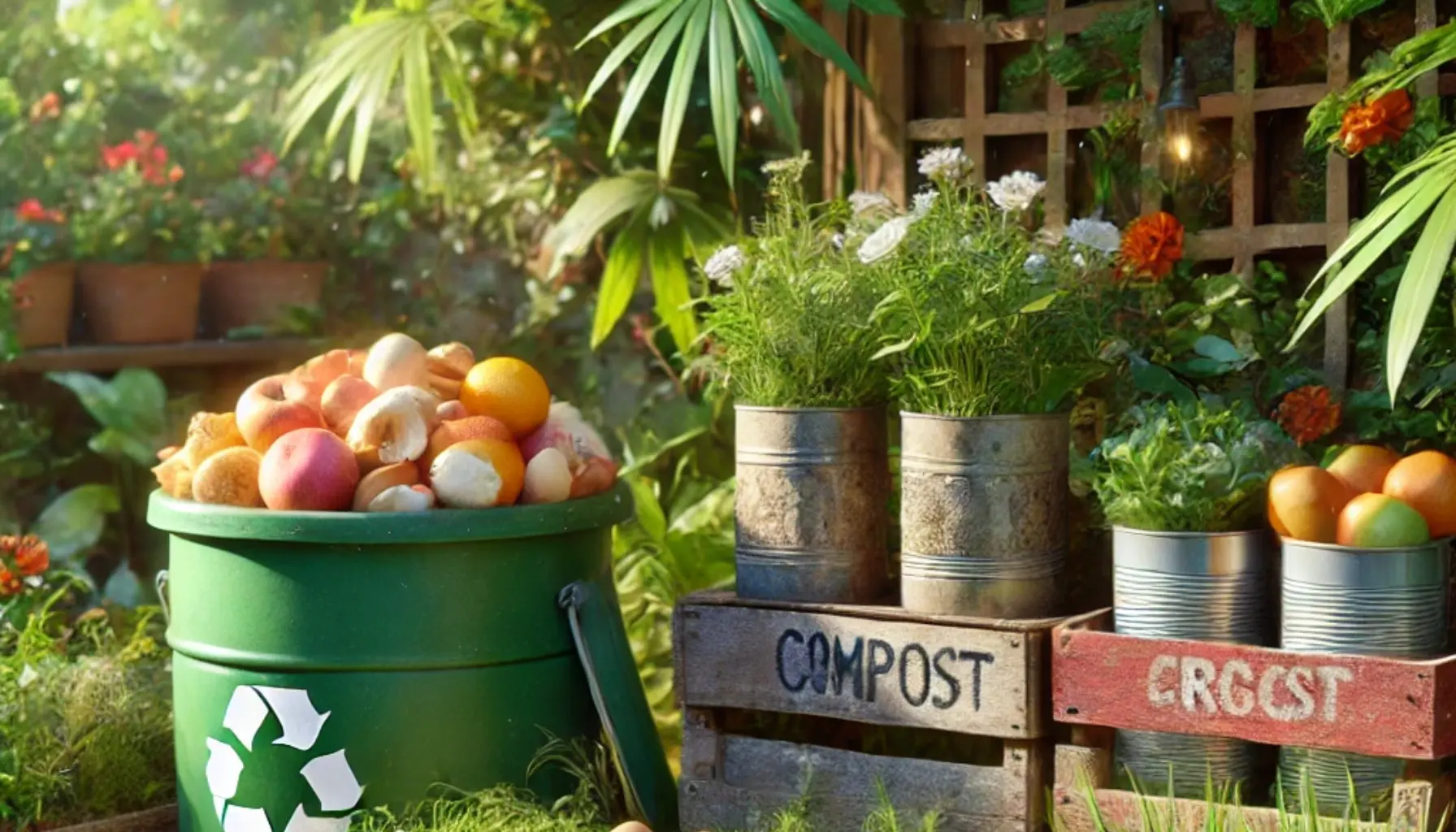Incorporating household waste into gardening practices is a sustainable and cost-effective way to enrich your garden while reducing your environmental impact. From composting organic scraps to creatively repurposing everyday items, household waste can be transformed into valuable resources for your plants.
This guide outlines practical methods to recycle waste and integrate sustainable practices into your gardening routine.
Why Should You Use Household Waste in Gardening?
Repurposing waste offers significant benefits for both your garden and the planet:
- Eco-Friendly Impact:
- Reduces the amount of waste sent to landfills, lowering methane emissions and pollution.
- Cost Savings:
- Cuts expenses on fertilizers, soil amendments, and gardening tools by reusing materials you already have.
- Enhanced Soil Health:
- Organic waste contributes essential nutrients to the soil, improving plant growth.
- Promotes Sustainability:
- Encourages a circular system where waste is reused instead of discarded.
Utilizing household waste in gardening is a practical step toward creating an environmentally friendly and resourceful garden.
Using Organic Waste: Turning Scraps into Plant Nourishment
Kitchen and yard waste are among the most valuable resources for gardeners. Here are effective ways to use organic scraps:
- Vegetable and Fruit Peels:
- Compost these scraps to create nutrient-rich soil amendments.
- Coffee Grounds:
- Rich in nitrogen, coffee grounds improve soil structure and fertility. Add them to compost or sprinkle directly onto the soil.
- Eggshells:
- Crushed eggshells release calcium into the soil, preventing blossom-end rot in tomatoes and peppers.
- Banana Peels:
- A great source of potassium and phosphorus. Soak peels in water to create a liquid fertilizer or bury them near plants.
- Grass Clippings:
- Use as mulch to retain moisture, regulate soil temperature, and suppress weeds.
Organic waste, when used correctly, enriches the soil, supports healthy plant growth, and reduces the need for chemical fertilizers.
Creative Ways to Recycle Everyday Items in the Garden
Non-organic household items can be repurposed creatively for gardening purposes:
- Plastic Bottles:
- Turn them into mini greenhouses for seedlings or use them as slow-drip irrigation systems.
- Tin Cans:
- Paint and reuse them as planters for herbs or small flowers.
- Glass Jars:
- Ideal for propagating cuttings or as decorative terrariums.
- Cardboard and Paper:
- Use shredded material as mulch or add it to compost piles for carbon balance.
- Wooden Crates and Pallets:
- Transform them into raised garden beds or tool storage units.
Repurposing items not only saves money but also adds personality and charm to your garden.
Step-by-Step Guide to Starting Composting at Home
Composting is an excellent way to recycle organic waste while improving soil health. Follow these steps to begin composting:
- Choose a Composting Method:
- Indoor Bins: Ideal for small spaces; opt for worm composting (vermiculture) or a kitchen compost bin.
- Outdoor Piles: Suitable for larger gardens with more waste.
- Add the Right Ingredients:
- Green Materials: Fruit peels, vegetable scraps, coffee grounds, and grass clippings provide nitrogen.
- Brown Materials: Dry leaves, shredded paper, and cardboard add carbon.
- Layer and Aerate:
- Alternate layers of greens and browns. Mix the pile weekly to provide oxygen and speed up decomposition.
- Maintain Moisture Levels:
- Keep the compost pile damp but not soggy. Adjust by adding water or dry materials as needed.
- Harvest Your Compost:
- When it becomes dark, crumbly, and smells earthy, your compost is ready to use as a soil conditioner or mulch.
Composting turns waste into a valuable gardening resource while reducing your household’s environmental footprint.
Innovative Uses of Non-Organic Waste in Gardening
Think beyond traditional uses and give non-organic waste a second life in your garden:
- Broken Pots:
- Use shards as drainage layers in larger pots or as decorative elements in pathways.
- Old Tires:
- Paint and stack them to create raised beds or colorful planters.
- Fabric Scraps:
- Use breathable materials to protect seedlings or cover soil during harsh weather.
- Wine Bottles:
- Insert bottles into the soil for slow-release irrigation, especially during hot weather.
- Metal Objects:
- Transform old tools or kitchen utensils into unique garden decor or plant markers.
These creative solutions reduce waste while adding functionality and style to your garden.
Sustainable Gardening Benefits of Reusing Waste
The benefits of repurposing waste extend beyond immediate savings or aesthetics:
- Reduced Waste:
- Diverts significant amounts of household waste from landfills.
- Healthier Ecosystems:
- Compost enhances soil biodiversity, promoting a healthier environment for plants and beneficial insects.
- Environmental Impact:
- Decreases the need for chemical fertilizers and reduces your gardening carbon footprint.
- Inspiration for Others:
- Demonstrates sustainable practices, encouraging friends and family to adopt similar habits.
Reusing waste is not just good for your garden but also contributes to a healthier planet.
Conclusion: Transform Household Waste into Gardening Gold
Reusing household waste in gardening is an impactful and rewarding practice. From composting organic scraps to repurposing non-organic items, there are endless opportunities to turn waste into resources that benefit both your garden and the environment.
By incorporating these ideas, you’ll not only reduce waste but also create a thriving, sustainable garden. Start today and enjoy the satisfaction of transforming your garden with the power of recycling!

